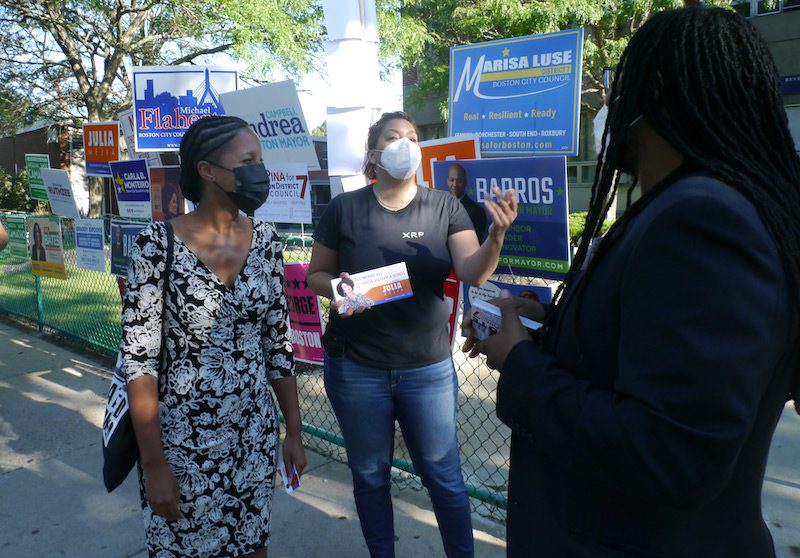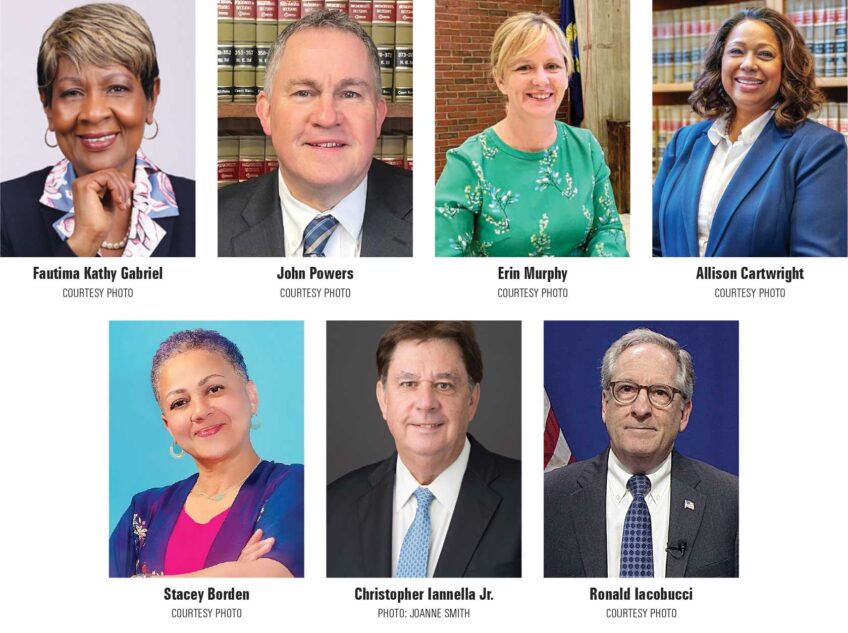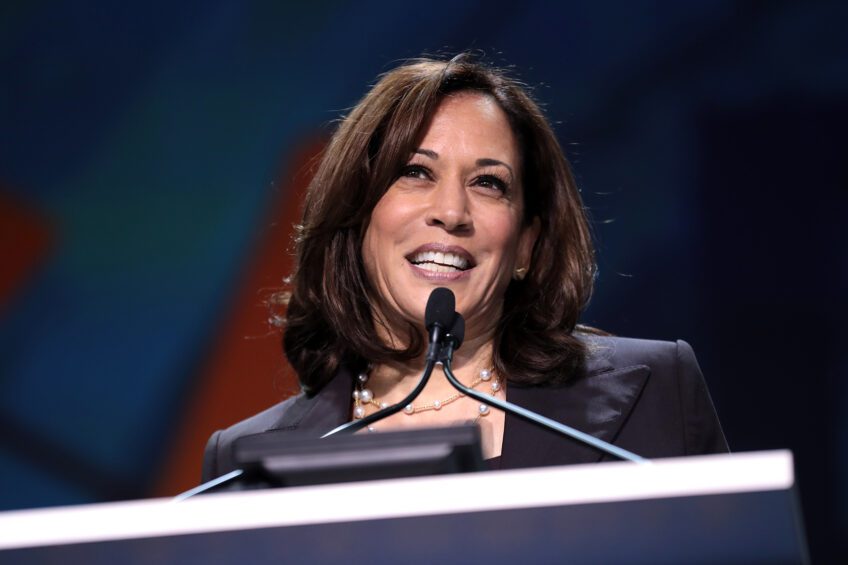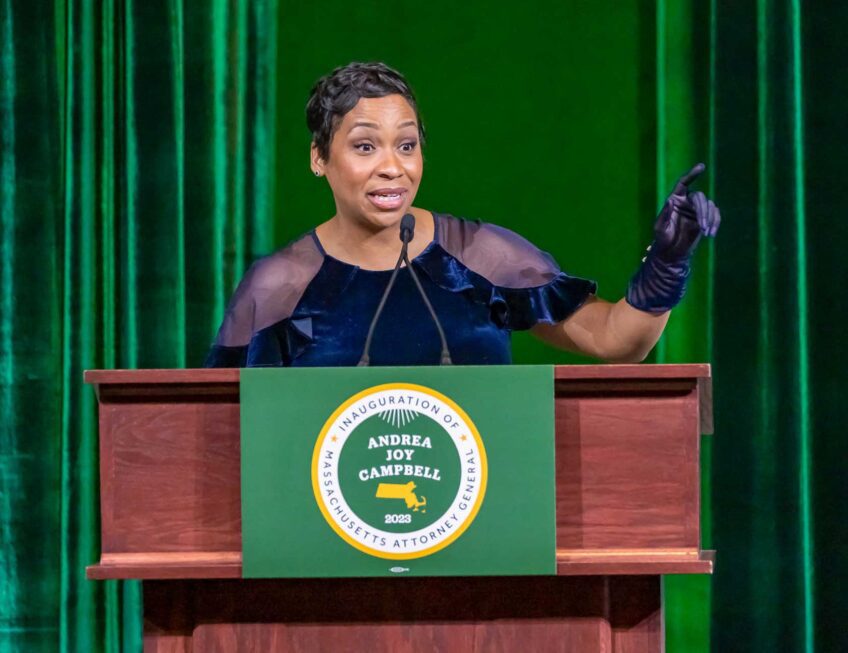
In addition to the preliminary race for Boston’s next mayor, several city council seats are being contested, and candidates faced off on Sept. 14 for their chance to be on the November ballot.
There are four open seats for city council at-large with two incumbents topping the rankings — Michael Flaherty of South Boston and Julia Mejia of Dorchester. Flaherty has served on council since 2013, with a prior tenure from 2000-2008. He finished on election night with 14.99% of the vote, while Mejia, the first Afro-Latina and first immigrant councilor elected in 2020, followed closely behind with 14.07% of the vote.
Finishing third with 12.13% of the vote was Ruthzee Louijeune, a Boston lawyer and community advocate born to Haitian parents and raised in Mattapan. She said coming in third is a testament to the work she and her team have been doing.
“We’ve been building a strong coalition that centers the issues that people care about — affordable housing, equity in our schools, and supporting our small local businesses, tackling transit justice and climate justice,” she said. “And that’s the message that’s been resonating with voters. So I’m feeling good.”
Louijeune added that her supporters are excited to see a woman of Haitian heritage do so well in the election and possibly make it to city hall.
“The third largest Haitian diaspora is right here in Boston and we haven’t had any representation in City Hall — that’s a travesty,” she said. “There’s a lot of excitement, that I could bring that language access, that cultural representation.”
Also on track to possibly make history is Kendra Hicks of Jamaica Plain who brought in just under 50% of the vote to represent District 6, surpassing West Roxbury resident Mary Tamer by more than 1,200 votes. Hicks is a first-time candidate and could potentially be the first woman of color and first Jamaica Plain resident elected to represent the district.
“That’s really a show of force in terms of the shift in tide that we’re seeing in the City of Boston in terms of leadership,” Hicks said. “I think that for decades, we’ve had a lot of the same, and the people in the city are really ready to be represented by folks that they feel are not only upholding their values, but also have the personal experience to bring into the way that they make decisions at city hall.”
A single mother of a 5-year-old son with autism, Hicks told the Banner that campaigning with him at home due to the COVID-19 pandemic has been a struggle, but that the overwhelming support from the community has made it well worth it.
“The support in Jamaica Plain was massive, and the reception that we got in West Roxbury was absolutely more than we could have hoped for,” she said. “We entered this campaign being very clear that we did not want to paint our neighbors with a broad brush …. and that we were going to show up and we were going to talk to people and we were going to move people and bring people with us. And that’s exactly what we did.”
With just 48 days until the November election, all candidates the Banner spoke to agreed that mobilizing voters would be extremely important, as turnout for the preliminary was low.
At-large Councilor Mejia said in a statement, “I am proud of the work my campaign did in meeting people where they are at in the preliminary, but the turnout shows that more needs to be done. Too many people feel that they have nothing to vote for, that government does not work for them. We all have the responsibility of doing the work and convincing everyone in Boston that they have a place at the table, no matter their zip code, race, sexual orientation, socio-economic status.”
Brian Worrell, who came out as the front runner for the District 4 seat with just over 25% of the vote, said getting out the vote has been a major focus of his campaign from the beginning, and that his team will continue to center turnout.
In a similar being he said his other major goals is to “unite this district” and “educate this district on civics.”
“We need to make sure that this office is one of the community — that we’re working in collaboration with our community members, that they build a part of this office and this candidacy,” he said.
Worrell, a real estate broker and a small business owner running on a platform of “economic empowerment” will be on the ballot with Evandro Carvalho, a former member of the Massachusetts House of Representatives and most recently the executive director of the city’s Human Rights Commission who won 18% of the vote.
In District 6, Hicks is joined on the ballot by another first-time candidate and West Roxbury native Mary Tamer. A former Boston School Committee member and president of the League of Women Voters of Boston, Tamer touts her political experience heading into November.
In a brief interview with the Banner, Tamer commented on how this election has been shaped by the ongoing coronavirus pandemic.
“I think so many people have shared struggles — the challenges, the hardships that they face, and it’s just demonstrated how much work we have to do and why we really need folks who show up, who are there not only there to listen, but to address the problems that are being brought forward,” she said.
Neither District 7 candidate has yet returned requests for comment but the two that have made it beyond the preliminary election are Tania Anderson and Roy Owens Sr.
Running to represent Roxbury, Dorchester, the South End, and Fenway, Anderson comes into the race as a product of the neighborhood. On her campaign site, she highlights her experience “as a foster mom to 17 kids, a mental health provider [and] a non-profit leader working to support local small businesses” as qualifications for the job.
Owens came in at 17% compared to Anderson at 26%, and was also in the running for councilor at-large but did not make the cut. His platform is “fighting for our community, promoting traditional family values, common sense, and a safe neighborhood for our children as well as dependable care for our senior citizens.”
Candidates for councilor at-large that will appear on November’s ballot include incumbents Michael Flaherty and Julia Mejia; Boston Public School teacher Erin Murphy; addiction care social worker Carla Monteiro; outreach manager for The Educational Justice Institute at MIT, David Halbert; former at-large city councilor and former state representative Althea Garrison and union ironworker Bridget Nee-Walsh.






